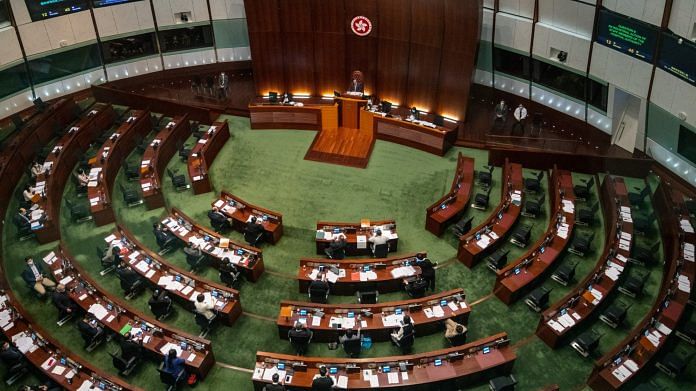Hong Kong: Hong Kong democracy activists and opposition politicians were among dozens of people taken into custody on suspicion of violating the city’s controversial national security law, in what appeared to be the largest roundup yet under the China-imposed legislation.
Former lawmakers Alvin Yeung, James To, Andrew Wan and Lam Cheuk-ting, as well as prominent academic and activist Benny Tai, were arrested Wednesday morning by the police’s national security branch on allegations of subversion, according to Facebook postings and media reports. The allegations were in relation to an informal primary that drew more than 600,000 voters in July to choose candidates for a September legislative election that was subsequently postponed by the government.
Some 50 people were swept up by police in the operation, local media including broadcasters Now TV and TVB reported. A police spokesperson didn’t immediately respond to a request for comment.
Activist Ventus Lau was arrested in relation to last year’s legislative election primaries organized by the pro-democracy side, a Lau associate said in a WhatsApp post. The Apple Daily newspaper reported that Robert Chung, a pollster who helped develop the website and tally the votes for the primary, was detained.
Also arrested was former lawmaker Claudia Mo, a leading opposition figure and one of the city’s most outspoken critics of China’s policies in Hong Kong.
The mass arrests of largely moderate pro-democracy campaigners accelerates an ongoing political crackdown in the Asian financial hub, which has prompted condemnation from foreign governments, U.S. sanctions and the suspension of numerous extradition treaties with Hong Kong. The move comes as the outgoing Trump administration continues to hit Beijing over its assertive policies in the city and as President-elect Joe Biden prepares to take office this month, with China representing one of his administration’s main foreign policy challenges.
“This is a total sweep of all opposition leaders,” said Victoria Hui, an associate professor at the University of Notre Dame specializing in Hong Kong politics. “If running for office and trying to win elections means subversion, it is clear that the NSL is aimed at the total subjugation of Hong Kong people. There should be no expectation of elections in any sense that we know it if and when elections are held in the future.”
Political opponents
The opposition primary contest at the heart of the latest police roundup drew 610,000 residents to the polls — more than 13% of the city’s registered voters — in a procedural exercise common in democracies worldwide. The turnout underscored the momentum generated by Hong Kong’s historic protest movement, on which the pro-democracy opposition was hoping to capitalize in a Legislative Council election originally scheduled for September.
Opposition figures hoped to access a provision in the city’s charter to force Chief Executive Carrie Lam to resign by voting down her budget. The primary was condemned by China’s top agencies for Hong Kong as an “unlawful manipulation” of the city’s election system and a violation of the national security law.
However, Hong Kong’s government first disqualified a number of opposition figures and then delayed the election by a full year, citing the coronavirus.
U.S. Secretary of State Michael Pompeo said at the time that there was “no valid reason for such a lengthy delay,” and that the “regrettable action confirms that Beijing has no intention of upholding the commitments it made to the Hong Kong people.”
“The political purge continues in Hong Kong,” said U.S.-based activist Samuel Chu, the managing director of the Hong Kong Democracy Council. The Chinese Communist Party “is remaking the rule of law and government in Hong Kong in its own image as a one-party authoritarian regime with lightning speed.”
‘Beijing’s intention’
The national security law was imposed by Beijing on the former British colony in June, sparking international condemnation led by the U.S. that Beijing was reneging on promises to guarantee the city’s unique freedoms following its return to Chinese rule.
While Chinese officials have justified the legislation — which bars subversion, terrorism, secession and collusion — with foreign forces as a necessary tool to quell local unrest and restore stability to the city after historic protests in 2019, the law has so far mainly been used against non-violent political opponents and dissidents.
Chu, the U.S.-based activist, said he has already briefed key administration and Congressional leaders and offices on what has just happened in Hong Kong.
“I can assure you that if Beijing’s intention is to take advantage of the presidential transition and a new Congress, their actions are not going unnoticed by U.S. officials,” he said. “I do believe this is part of a series of actions to test the incoming Biden administration’s resolve and commitment to Hong Kong and the new Congress — and I am confident that neither will abandon its strong commitment to Hong Kong.”- Bloomberg
Also read: After a bad year for personal freedom, try liberalism



